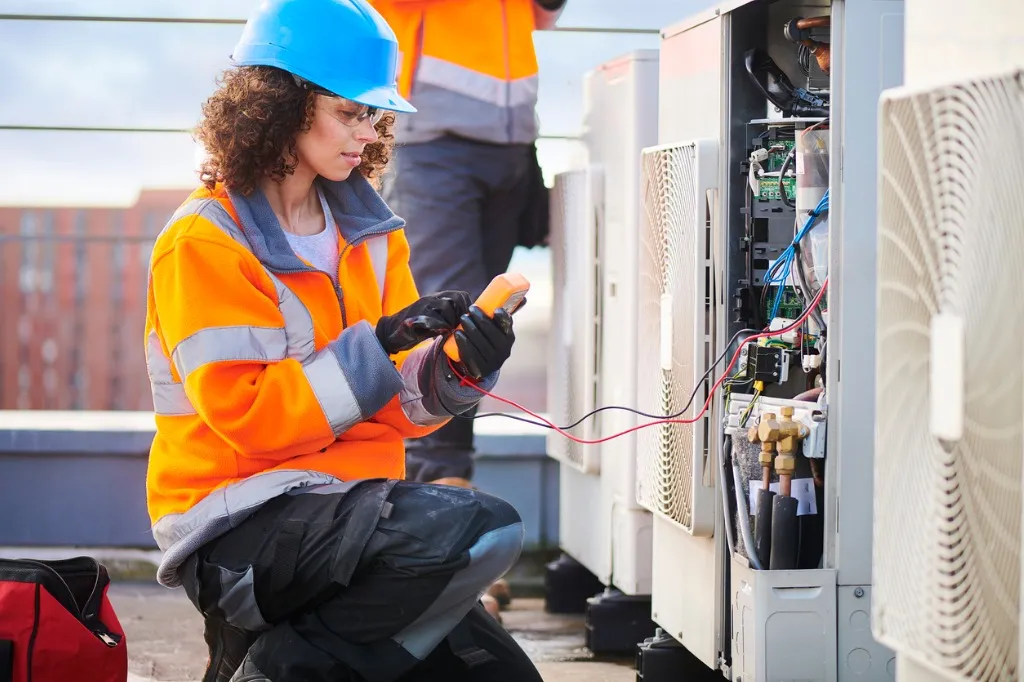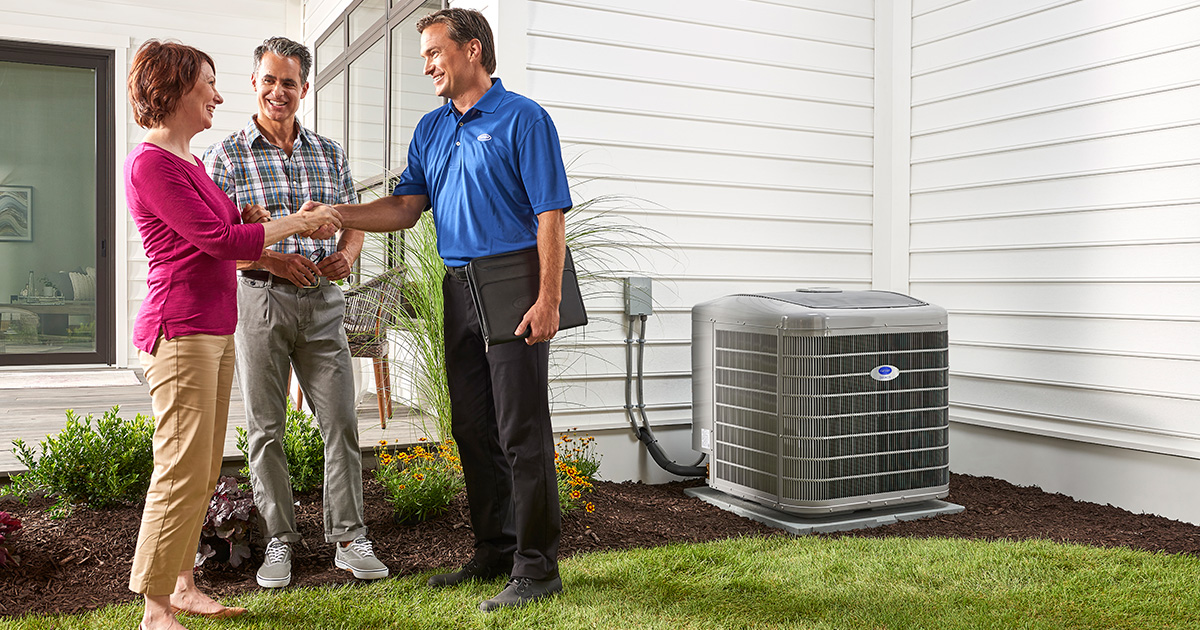Residential Heating and Air Conditioning Solutions for Year-Round Comfort
Residential Heating and Air Conditioning Solutions for Year-Round Comfort
Blog Article
An Extensive Appearance at Cooling And Heating Providers and Their Effect On Power Effectiveness and Price Financial Savings
With technological developments like smart thermostats and high-efficiency parts, the possibility for maximizing system performance is large. As we discover the complex relationship between HVAC systems and functional prices, consisting of the shift towards environmentally friendly alternatives, the question develops: how can these approaches be successfully applied to optimize both ecological and economic advantages?

Value of Cooling And Heating Solutions
heating and cooling systems are an essential component of modern-day buildings, playing a critical duty in keeping comfy and healthy and balanced interior environments. These systems, encompassing air, home heating, and ventilation conditioning, are necessary for managing temperature, humidity, and air quality, thus making certain the health of residents. Reliable a/c systems contribute considerably to creating an ideal interior climate, which is vital for both business and residential rooms.
In business buildings, a/c systems are essential to giving a safe and effective setting. By regulating interior climate conditions, these systems assist avoid the growth of mold and the spread of air-borne impurities, thus securing the health of employees and consumers. Additionally, in property setups, cooling and heating systems boost living conditions by using constant thermal convenience and enhancing indoor air quality, which is vital for overall wellness.
Furthermore, the layout and maintenance of cooling and heating systems have a straight influence on power consumption and operational prices. Effectively developed and preserved systems can considerably minimize power use, bring about reduced energy bills and a smaller carbon impact. The efficiency of these systems hence plays a critical duty in advertising sustainability and power preservation within structures, highlighting their importance in the contemporary building landscape.
Developments in Heating And Cooling Technology
Technology in cooling and heating technology is revolutionizing the method structures manage indoor environments, introducing a brand-new era of efficiency and control. Recent innovations have focused on optimizing energy intake while boosting customer convenience. One significant advancement is the combination of clever thermostats, which utilize synthetic knowledge to discover tenancy patterns and change temperatures accordingly, decreasing unneeded energy use.
Variable Refrigerant Circulation (VRF) systems stand for another significant leap forward. These systems enable for specific temperature control in different areas of a structure, improving comfort and lowering energy waste. VRF modern technology is particularly beneficial for large business areas, providing adaptability and scalability.
In addition, the introduction of Net of Things (IoT) tools has actually transformed a/c systems right into interconnected networks efficient in real-time data collection and evaluation. This connectivity enables anticipating upkeep, making sure systems run at peak performance and minimizing unexpected downtime.
Moreover, developments in products and design, such as the use of high-efficiency coils and compressors, have boosted general system efficiency - Heating Contractor. The adoption of eco-friendly cooling agents likewise highlights the sector's dedication to sustainability
These technological developments are critical in decreasing operational expenses and environmental influence, establishing new standards for constructing environment monitoring.
Cooling And Heating Upkeep and Performance
Making certain optimum efficiency of cooling and heating systems prolongs beyond technical developments; it likewise hinges on efficient maintenance techniques. Regular maintenance is essential for maintaining efficiency, lowering energy consumption, and expanding the lifetime of cooling and heating systems. The primary objective is to guarantee that all elements operate at their peak possibility, thus decreasing energy wastage my site and keeping consistent interior convenience degrees.
Regular maintenance tasks, such as cleaning or replacing air filters, checking refrigerant levels, and inspecting ductwork for leaks, are crucial for stopping unneeded pressure on the system. Stopped up or unclean filters can obstruct air movement, triggering the system to function harder and eat even more power. Furthermore, inadequate refrigerant degrees can decrease cooling down performance, resulting in higher operational costs.
Additionally, routine examinations by qualified professionals can determine prospective problems prior to they intensify right into expensive repairs or system failings. These assessments frequently include checking electric connections, adjusting thermostats, and ensuring the overall honesty of the a/c system. By dealing with small troubles early, house owners and businesses can prevent unanticipated breakdowns and boost energy effectiveness.
Cost-Effective Heating And Cooling Solutions
For those aiming to get one of the check this site out most out of their air, air flow, and heating conditioning systems without damaging the bank, exploring economical a/c solutions can make a considerable distinction. One immediate measure is to purchase programmable thermostats, which permit users to establish details temperature levels for various times of the day, maximizing energy use and reducing unneeded intake. By automating temperature modifications, home owners can achieve substantial financial savings on power expenses.
Routine upkeep is an additional critical element of affordable HVAC management. Making certain that filters are cleaned up or changed routinely, ductwork is sealed, and systems are serviced by experts can prevent pricey repair services and enhance system durability. Preventative upkeep not just preserves system efficiency yet likewise assists in preventing unanticipated break downs that can lead to expensive emergency repair services.
Additionally, retrofitting existing systems with energy-efficient components, such as variable speed electric motors or high-efficiency compressors, can be a prudent investment. These upgrades improve operational effectiveness, decrease energy usage, and can typically be executed at a fraction of the expense of a full system replacement.
Ecological Effect Reduction
Decreasing the ecological effect of A/c systems is essential in today's pursuit of sustainable living. HVAC systems are considerable factors to power consumption, accounting for nearly 40% of energy use in business structures.
Technological advancements in cooling and heating design and operation, including the combination of clever thermostats and energy-efficient heatpump, are essential visit the website in lowering carbon footprints. These innovations permit enhanced energy usage, minimizing wastefulness and enhancing general system efficiency. Furthermore, adopting routine upkeep techniques ensures cooling and heating systems run at peak efficiency, further curtailing unnecessary power intake.
Additionally, making use of eco-friendly cooling agents is essential, as standard cooling agents, like CFCs and HCFCs, have actually been phased out as a result of their ozone-depleting properties. Modern choices, such as hydrofluoroolefins (HFOs), offer reduced ecological threats, lining up with international ecological procedures. By accepting these lasting methods, HVAC solutions can play a transformative function in minimizing environmental influences, advertising energy efficiency, and fostering a much more sustainable future.
Final Thought

Additionally, the layout and upkeep of Heating and cooling systems have a straight effect on power usage and functional costs. Normal maintenance is crucial for maintaining effectiveness, minimizing power intake, and expanding the life period of Cooling and heating systems. Cooling and heating systems are substantial contributors to energy intake, accounting for almost 40% of power usage in industrial buildings. In addition, adopting routine upkeep techniques makes sure Cooling and heating systems run at peak efficiency, more curtailing unneeded power intake.
The shift to environmentally pleasant A/c systems even more lowers operational costs and advertises sustainability. (Heating Contractor)
Report this page